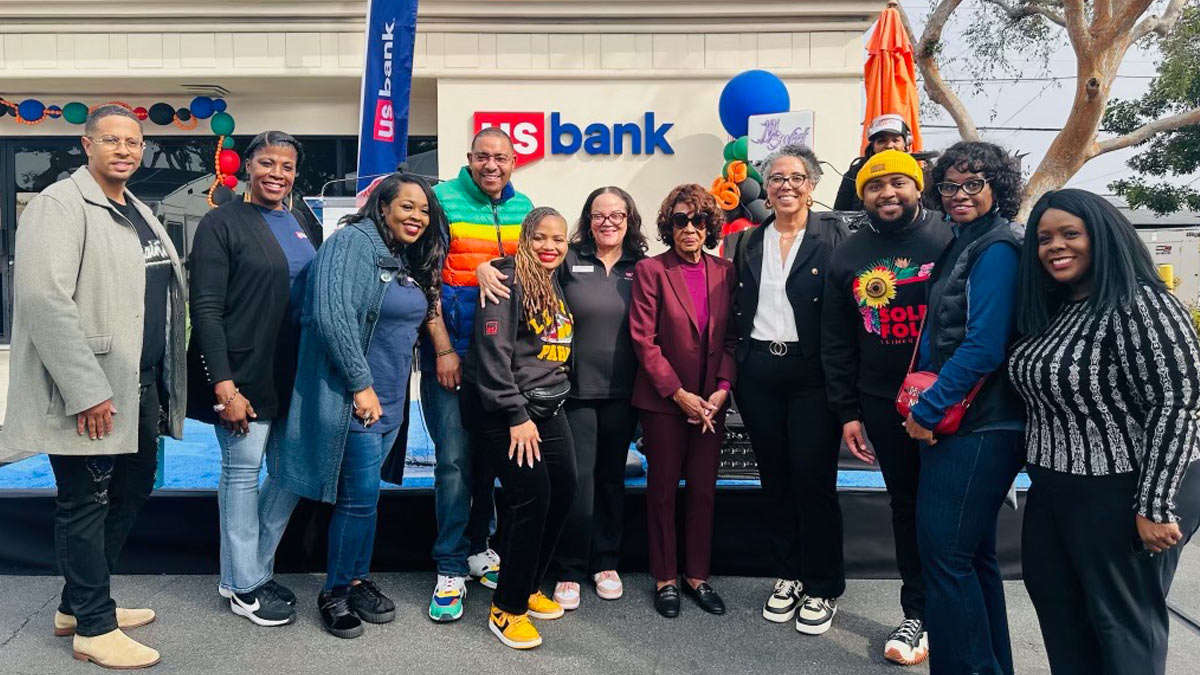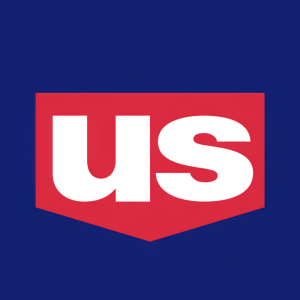Bank Expanding Program Designed To Help Underserved Small Businesses Grow
U.S. bank is doubling its team of Business Access Advisors in order to serve more cities
NORTHAMPTON, MA / ACCESSWIRE / March 11, 2024 / U.S. Bank

U.S. Bank Business Access Advisors spend time in the community connecting the bank to others, which is one reason Business Access Advisor Delphine Pruitt, second from right, attended and spoke at the recent grand opening of the bank's first Black Heritage Community branch in Los Angeles's Crenshaw neighborhood.
Originally published on U.S. Bank company blog
As a Business Access Advisor at U.S. Bank, Cassandra Kidd's goal is to help underserved small businesses thrive by providing them access to information, connections and other resources.
Kidd and other Business Access Advisors don't sell any products but can refer clients to bankers within U.S. Bank or to nonprofits that offer financing. In one recent success story, Kidd helped a Black-owned company that provides information technology services obtain a loan after the owner had struggled to qualify for traditional bank financing.
Kidd also introduced the business owner to the bank's Business Diversity Lending (BDL) program, a special purpose credit program that provides credit and financing designed to help minority-, women- and veteran-owned businesses grow and thrive. The business owner met the qualifications and was able to receive additional financing for his company.
Such outcomes are the primary goal of the U.S. Bank Business Access Advisor program, which was launched in 2021 with a focus on helping businesses in underserved communities, including communities of color, gain access to capital.
The Business Access Advisors, or BAAs, are placed in markets to help business owners gain access to capital, financial education and connections, said Queanne Smith, who leads Business Diverse Segment Strategy for U.S. Bank.
The BAAs also maintain and grow referral relationships with Community Development Financial Institutions and non-profit organizations that can assist small business applicants currently unable to get financing directly from the bank.
"Partnering with CDFIs increases access to capital, fosters economic inclusion and expands financial opportunities for underserved communities," Smith said. "U.S. Bank increased the number of CDFI partners in 2023 to 100-plus participating organizations, which allows us to better bridge the finance gap and support community empowerment."
The BAA program is part of U.S. Bank Access Commitment®, the bank's long-term approach to help close the wealth gap for underserved communities, including communities of color. U.S. Bank started with nine BAAs serving Charlotte, North Carolina; Chicago; Colorado Springs and Denver, Colorado; Little Rock, Arkansas; Los Angeles; Minneapolis; Omaha, Nebraska; and Oakland, California.
Because of its success, U.S. Bank is now expanding the program by doubling the number of BAAs to 18 and expanding the strategy to six new states, Arizona, Nevada, Ohio, Tennessee, Washington and Wisconsin. The bank is also expanding the BAA program in California, hiring three additional BAAs in Los Angeles, Riverside and San Diego, and growing support for business owners in Hispanic communities.
"We acknowledge and value the Hispanic community and understand how important cultural engagement is to the communities we serve," Smith said. "Our BAAs are placed in markets to better support these communities and build stronger relationships."
"We have BAAs who speak Spanish in addition to English and can work with customers in their preferred language," she said. "Our strategy is to break down barriers, including language barriers, that can prevent wealth creation."
The BAA program serves small businesses, generally with
While helping to provide access to capital is a primary focus of the program, BAAs serve as trusted advisors with business in a variety of ways, she said.
"Our BAAs are also knowledgeable, helping to educate our clients about financial concepts during one-on-one sessions, seminars and curated workshops," Smith said. "They serve as a strong connector to U.S. Bank supplier diversity programs that can help small businesses become certified as minority-owned businesses, which can support them in building meaningful partnerships, operate in competitive markets and access new opportunities."
The BAAs also partner with community organizations to help business owners connect with resources that can help them, she said.
For example, the bank has held small business bus tours in Chicago and Los Angeles, visiting Black-owned businesses in underserved communities to discuss challenges entrepreneurs have encountered and ways to partner with U.S. Bank effectively.
"During 2023, we offered over 160 financial education seminars, and 2,200 coaching sessions with businesses and business owners through our Business Access Advisor program," Smith said.
"It's all around facilitating inclusive growth for underserved small businesses," she said. "Small businesses are part of the bedrock of the economy."
View additional multimedia and more ESG storytelling from U.S. Bank on 3blmedia.com.
Contact Info:
Spokesperson: U.S. Bank
Website: https://www.3blmedia.com/profiles/us-bank
Email: info@3blmedia.com
SOURCE: U.S. Bank
View the original press release on accesswire.com






